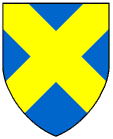
LIVES OF THE BISHOPS OF EXETER
ROBERT WARELWAST, nephew to William the third bishop of Exeter, had filled the office of Archdeacon of Exeter, and during the last seventeen years had been Dean of Salisbury, was now chosen successor to the late prelate. The consecration was performed at, Canterbury on 5th June, 1155, by the primate Theobald, assisted by the Bishops of Salisbury, Chichester, Ely, and Rochester ('Chronicon Gervasii'). It was to this bishop and to his successors that Henry II. confirmed the grant of the tithe of royal fish taken on the coasts of Devon and Cornwall - a privilege previously granted by King Henry I.
(See Grandisson's 'Register,' vol. ii. 27 ; Brantyngham's 'Register,' vol. ii. 27 and 37 : see also 'Mon. Angl' vol. vi. p.305.) On 1st March, 1160, he confirmed the right of sepulture to the newly established community of Benedictine nuns at Polslo near this city; and about the same time bestowed on his Chapter for their better maintenance "manerium de Meela (Melhuish) cum omnibus pertinentiis suis, quod Dei auxilio ego adquisivi." Amongst other witnesses to this deed of gift is Roger, the bishop's nephew. Sigebert in his 'Chronicon' (Paris ed. 1513) describes our prelate as "vir religiosus et timens Deum." After presiding over the diocese for a short period, he died happily on 22nd March, 1161, and was buried, according to Godwin, near his episcopal uncle in Plympton Priory; but if so, his remains must have been removed by Bishop Stapeldon early in the 14th century to Exeter Cathedral; for in the Fabric Roll of 1320 we read a charge for his grave "in fossato Dni. Roberti Warwest Epi.;" and in the regulations approved of by the Dean and Chapter of Exeter in the said Bishop Stapeldon's time (as appears by their statute-book, fol. 112), it is stated, that he was buried in the choir of his cathedral. "In obitu episcoporum super unumquemque debet poni pannus sericus et duo cerei dum Placebo et Dirige cantatur, et dum missa de eo cantatur; tantummodo episcopus scilicet, Robertus Warwest, qui jacet in choro, habet quatuor, dum celebratur pro eo." - At obituary services of the bishops, over the hearse should be placed a silken pall and two wax-lights; whilst vespers for the dead and matins and the mass of requiem are sung: only in the case of Bishop Robert Warwest, who lies in the choir, four wax-lights are used when celebrating for him.
We have seen a document of this bishop taken from the register of Rouen Cathedral, certifying that he was present when our most serene lord, Henry II., King of England, gave in Frankalmoigne to the canons of that Church, a moiety of the manor of Kilon (now called Kilham in the East Riding of Yorkshire), and handed his charter to its Archdeacon Gildo.
Arms ut prius.
